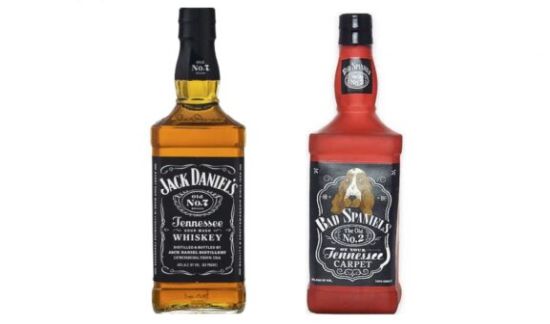Jack Daniel's Properties, Inc. v. VIP Products LLC, No. 22-148 (Supreme Court June 8, 2023)
Parodies are generally sheltered from trademark enforcement, but how far can you take a joke? On June 8, 2023, the Supreme Court of the United States ("the Supreme Court") found that when a trademark was used as a source identifier, the First Amendment parody defense did not apply. In its unanimous decision, the Supreme Court unanimously overturned a decision of the U.S. Court of Appeals for the Ninth Circuit's ("Court of Appeals") in a self-proclaimed "narrow" ruling.
Rogers Test
In general, courts apply a "likelihood of confusion" test to determine whether a trademark infringes another. The likelihood of confusion test requires the owner of a trademark to prove two elements:
- It has a valid, protectable trademark
- The infringer's use of the mark is likely to cause confusion
However, if the alleged infringer can prove that their use of the owner's mark is part of an "expressive work", the owner of a trademark must instead satisfy the Rogers test:
- The owner has a valid, protectable mark; and
- The alleged infringer's mark either has no artistic relevance to the underlying mark OR it explicitly misleads a consumer about the source or the content of the mark.
Background
Jack Daniel's is a well-known brand of Tennessee whiskey sold in a distinctive bottle. VIP Products is a dog toy company that makes and sells a line of chewable rubber toys called "Silly Squeakers". Most of the toys in their product line are designed to parody popular beverage brands (ie. Smella Arpaw vs. Stella Artois).
In 2014, VIP added "Bad Spaniels" to the toy line, designed to look like a bottle of Jack Daniel's with a few tweaks. Bad Spaniels was about the same size and shape as an ordinary bottle of Jack Daniels and boasted the same black label with stylized white text. Instead of "Jack Daniel's" on the bottle, it said "Bad Spaniels". The toy also made references to dog poop, replacing the slogan "Old No. 7 Brand Tennessee Sour Mash Whiskey" with "The Old No. 2 On Your Tennessee Carpet".

A photo of a Jack Daniels whiskey bottle (left) compared to the dog toy "Bad Spaniels" (right). Image Source: SCOTUS blog.
Jack Daniel's sued VIP for infringement and dilution, arguing that Bad Spaniels led consumers to "think that Jack Daniel's had created, or was otherwise responsible for, the dog toy".
Lower Court Decisions
VIP had argued that Bad Spaniels was simply a parody of the Jack Daniel's bottle and therefore (1) granted a defense against trademark infringement under the First Amendment, and (2) granted a "fair use" exemption against dilution.
The District Court rejected both arguments and held that there was a likelihood of confusion between the two marks. Consumers would believe that the Bad Spaniel's chew toy was originated, sponsored or approved by Jack Daniel's. The District Court also found that the confusion would lead to a negative association between Jack Daniel's and dog excrement, which would dilute the Jack Daniel's mark.
The Court of Appeals reversed the District Court's decision, ruling that the district court erred in applying the likelihood of confusion analysis. Bad Spaniels was a parody of Jack Daniel's, and therefore an "expressive work" to which the Rogers test applied. Since Jack Daniel's could not prove either prong of the Rogers test, there was no infringement. The Court of Appeals also ruled against Jack Daniel's on the dilution claim, stating that because Bad Spaniels was a parody, it fell under the "non-commercial use" exemption.
Supreme Court Decision
The Supreme Court found the Court of Appeals erred by automatically entitling Bad Spaniels to the Rogers test simply because it "communicated a humorous message". Instead, the Court of Appeals should have applied the traditional "likelihood of confusion" test for the infringement analysis. The Supreme Court clarified that the Rogers test was created for "artistic works" based on the view that works with an "expressive element" carried only a slight risk of confusing consumers about the source or content of the underlying work. For example, it was no considered infringement for a brand to name a song "Barbie Girl", because consumers were unlikely to think that the toy brand Mattel had created the song. It was more likely for consumers to confuse the source of a work when someone used another's trademark as a source identifier.
In this case, a parody was not considered to have an expressive element. The Supreme Court made it clear that using a mark to parody another mark was relevant to the confusion analysis because consumers were unlikely to think that the original owner of a trademark would be mocking its own product.
The Supreme Court also found the Court of Appeals erred by taking an expansive view of the non-commercial use exemption against dilution, effectively "nullifying Congress's express limit on the fair-use exclusion for parody". Instead, the Court of Appeals should have applied the "harm to reputation" test for the dilution analysis. The Supreme Court ruled that not every parody or humorous commentary necessarily falls within the non-commercial exemption – parody was only exempt from liability if it was not used to designate source. Therefore, the non-commercial use exemption similarly did not apply.
The case was remanded back to the lower courts.
Commentary
This case suggests that if you are considering creating a product that parodies a well-known trademark, you should take care to separate the "source identifier" from the "expressive element". If VIP had marketed the Bad Spaniels toy with more of an emphasis on its "Silly Squeakers" mark, perhaps the Rogers test would have applied.
The content of this article is intended to provide a general guide to the subject matter. Specialist advice should be sought about your specific circumstances.


